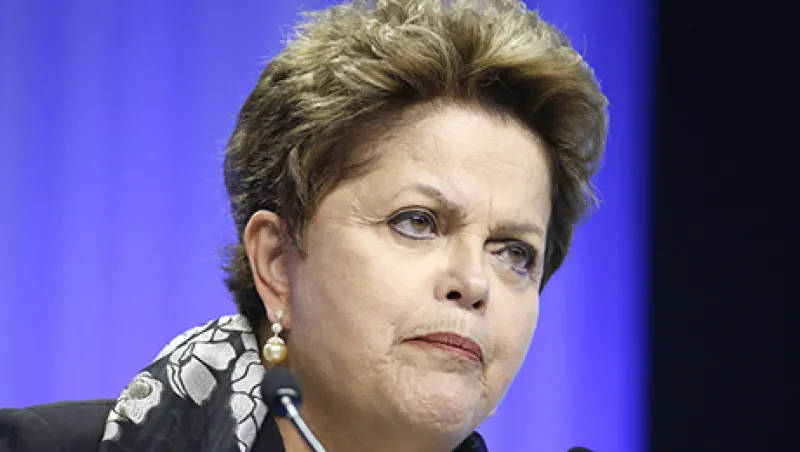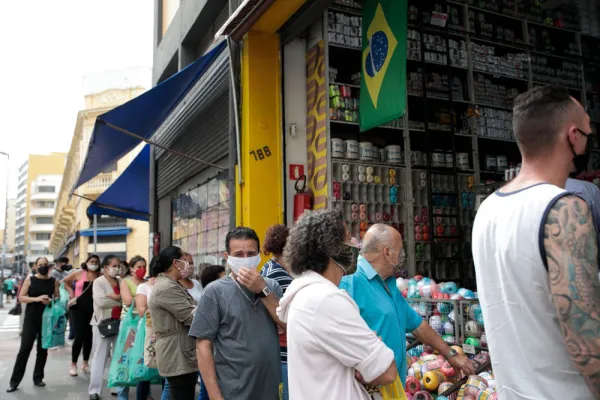Seeking to discard its membership in the so-called Fragile Five group of troubled merging market economies, Brazil has adopted fresh doses of fiscal and monetary discipline lately, helping to shore up financial markets. But the country has yet to embrace the elixir of reform that could reignite growth, analysts say.
The government of President Dilma Rousseff has pledged $18.5 billion in public spending cuts to bring its fiscal deficit under control. Moreover, Brazil’s central bank has raised its benchmark interest rate to a two-year high of 11 percent — up 3 percentage points in the past year — to bring down the high inflation that has eroded the country’s competitiveness.
The efforts to restore financial stability have supported prices on Brazil’s BM&F BOVESPA exchange. The index closed at 51,696 on Monday, up 15 percent from the recent low in mid-March but down 5 percent from a peak in mid-May.
Looking at the long term, are institutional investors convinced that Brazilian securities offer good prospects?
“Brazil is a large market which is continuously throwing up excellent opportunities,” says Jan Dehn, London-based head of research at Ashmore Investment Management, a firm specializing in emerging markets and with assets under management of $70 billion as of March 31. Dehn thinks the country’s financial fundamentals are good, including its primary fiscal surplus, large foreign exchange reserves and a commitment to keeping inflation under control. (A primary surplus is a fiscal surplus before allowing for debt interest payments.)
Yet Dehn acknowledges that the years of robust economic growth have passed. The government’s steady-as-she-goes policy of inflation fighting and fiscal discipline lacks the kind of supply-side measures required to push trend growth substantially higher by boosting productivity. As a result, he says, “the Brazilian market is not going to get superexcited on the upside, but it’s also not going to have a crisis.”
Steady and stable growth, marked by an absence of the sort of excessive exuberance that, for example, prompts risky corporate M&A deals, is often considered good for corporate bonds. Siddharth Dahiya, the head of the emerging-markets debt team of £324.5 billion ($541 billion) Aberdeen Asset Management in London, likes construction company OAS. Yields on U.S. dollar–denominated four-year bonds in the company, rated single- or double-B by various rating agencies, are 7 percent.
OAS is likely to gain from government policies to boost the country’s infrastructure, the deteriorating quality of which was partly behind the mass protests last June against the government’s record. But many institutional investors believe that Brazilian government policy exercises a malign effect on large parts of the corporate bond and stock markets.
“The Rousseff administration has been very interventionist. This interventionism has damaged the utilities and other sectors,” says Chris Kelly, managing director and deputy head of emerging-markets fixed income at $4.4 trillion BlackRock in London. He cites Brazil’s utilities, laid low by severe tariff cuts and heavy regulation designed to please household consumers and its state-owned banks, which have been pressured by the government to extend credit to questionable borrowers. “The government uses companies to achieve policy goals,” warns Kelly, who advises that the bonds of companies called into action in this way are best avoided.
One way for investors to avoid domestic politics, as well as fears about the Brazilian economy, is to concentrate on exporters. “A lot of emerging-markets bond issuers are global businesses,” says Jon Brager, senior credit analyst at £26.9 billion Hermes Fund Managers in London. He recommends São Paulo–headquartered Braskem, an export-focused petrochemical company. The company’s triple-B-minus bonds have a spread of 330 basis points over ten-year U.S. Treasuries.
Institutional investors agree that there are several well-run companies in Brazil, relatively free of government intervention. But are there enough of them?
The IBOVESPA has ten to 12 “really good companies,” says Xavier Hovasse, Paris-based manager of the €262 million Emerging Discovery Fund at investment firm Carmignac Gestion. He cites a number of different brands, including global brewing company AmBev and aircraft manufacturer Embraer. There is, however, a problem: “Three quarters of the Brazilian stock index is really uninspiring,” he concludes. As a result, Hovasse says, the prices of the remaining quarter have been bid up by investors to the point where they look too expensive.
Hovasse says investors in the stock market must also take into account the fact that Brazil’s currency, the real, is set to fall sharply because it is considerably overvalued. To achieve what he regards as a normal and healthy current-account deficit of 0.5 percent of gross domestic product or so, he says the real needs to fall from its rate of 2.24 to the dollar, as of May 30, to about 2.70. Otherwise, Brazilian exporters will not be sufficiently competitive.
Responding to the twin issues of currency overvaluation and too much demand chasing too few good stocks, Carmignac has either trimmed its holdings of Brazilian stock investments or, as in the case of AmBev, sold out altogether. Carmignac is, as Hovasse describes, “massively underweight Brazil.” His Emerging Discovery Fund, for example, has a 2 percent holding in Brazilian stocks, compared with 10 percent for the index’s underlying benchmark. The fund is benchmarked with a 50 percent weighting to the MSCI emerging-markets small-cap index and a 50 percent weighting to the MSCI emerging-markets midcap index.
There is a final reason for Carmignac’s Brazilian bearishness: the firm’s skepticism about the government’s ability and willingness to carry out the reforms necessary to make the nation sufficiently competitive. “Brazil’s issues have not been addressed at all by the current government,” says Hovasse. He cites Brazil’s low productivity, poor infrastructure and high corporate taxes.
Many institutional investors say that victory in the October 5 general election of business-friendly opposition leader Aécio Neves would make them more bullish on Brazilian financial markets, since they believe that Neves would address many of the country’s competitiveness problems. Rousseff remains the front-runner in opinion polls, however.
Get more on emerging markets.






